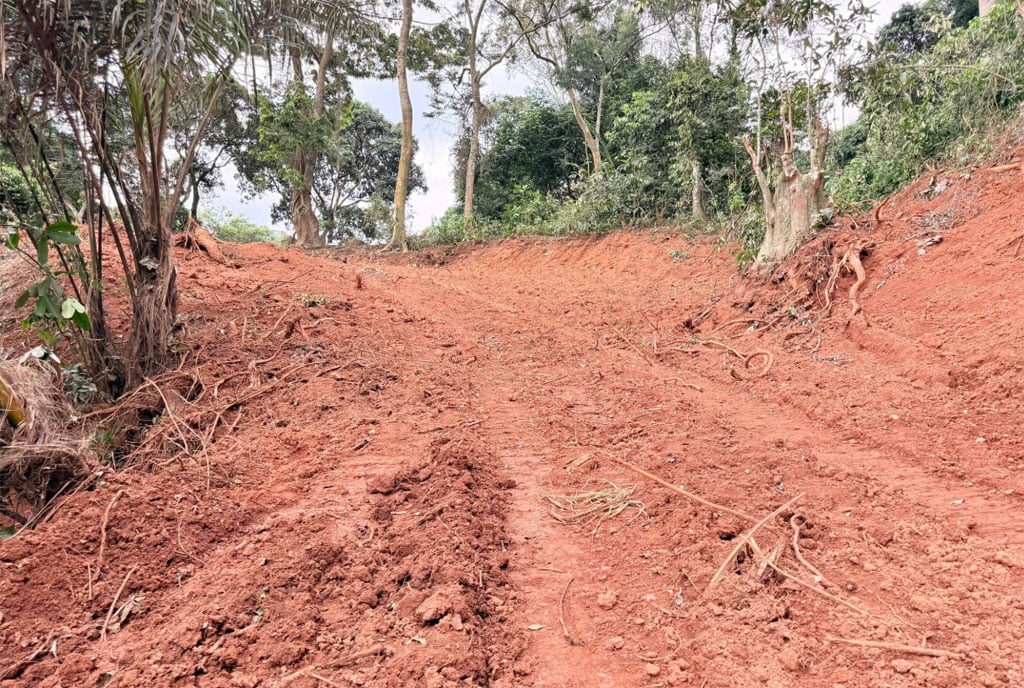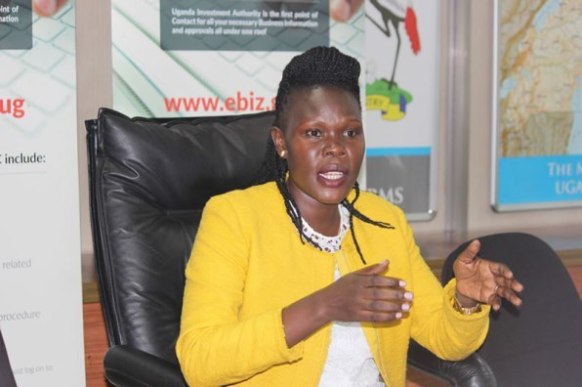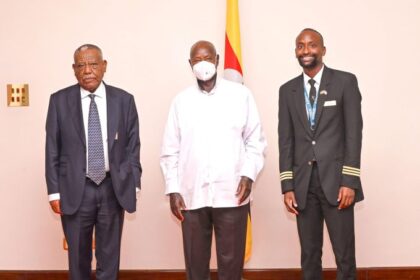ENTEBBE- In a move that has ignited widespread outrage among environmentalists, civil society groups, and urban residents, the State Minister for Finance and Privatization, Evelyn Anite, finds herself at the center of a heated controversy over the allocation of the pristine Kitubulu Central Forest Reserve in Entebbe to a Chinese investor.
The decision, which paves the way for the clearing of 150 acres of this vital tropical rainforest to make room for government offices, a shopping mall, and other commercial developments, has been framed by critics as a blatant betrayal of environmental stewardship.
At the heart of the furor is the allegation that President Yoweri Museveni, known for his public advocacy on conservation, was deliberately misled about the land’s status as a protected forest, allowing Anite to secure his approval under false pretenses.
The saga unfolded publicly last when Anite announced the $500 million project led by Paul Zhang, chairman of the Tian Tang Group, a Chinese conglomerate with prior investments in Uganda’s industrial parks. Speaking after a meeting with the investors in Kampala, Anite described the initiative as a cornerstone of the government’s long-standing plan—first floated in 2018—to decongest the capital, Kampala, by establishing an “alternative capital city” in Entebbe. “Unless you are in a government-constructed facility, that office will have to move to Entebbe,” she declared, emphasizing the relocation of ministries, departments, and agencies from rented private spaces to a new government campus.

The development, she added, would include a state-of-the-art international conference center, a five-star hotel, an international school, hospitals, and modern housing—amenities aimed at attracting middle-income professionals and expatriates drawn to Entebbe’s proximity to Entebbe International Airport.
Zhang echoed Anite’s enthusiasm, crediting her directly for facilitating the deal. “Some time ago, I approached the minister with a proposal to build an international conference center along with other amenities such as hospitals, international schools, and modern housing in Entebbe,” he stated. Anite, in turn, recounted escorting Zhang to the president, who reportedly greenlit the allocation without fully grasping the ecological ramifications.
Conservationists now argue this was no oversight but a calculated omission: the land in question is not barren real estate but a Category IV protected area under the International Union for Conservation of Nature (IUCN), teeming with biodiversity and serving as a critical buffer for Lake Victoria.
Kitubulu’s irreplaceable value underscores the recklessness of the giveaway.
This evergreen canopy rainforest, one of the last remnants of the lowland woods encircling Lake Victoria, acts as a natural filtration system, trapping water pollutants and silt that threaten the lake basin’s fragile ecosystem. Home to diverse flora and fauna—including rare bird species and endangered primates—its destruction would exacerbate Uganda’s alarming biodiversity loss.
For Kampala’s 1.7 million residents, already starved of green spaces, Kitubulu represents a rare urban oasis.
Unlike Nairobi, which boasts the expansive Karura Forest (1,041 hectares) and Nairobi National Park (117 square kilometers) within city limits, or Lusaka’s 6,715-hectare national park just 8 kilometers from its business district, Kampala lacks a single public natural park. Historic sites like Centenary Park and City Square have been repurposed for commercial use, leaving Kitubulu as the sole haven for recreation.
Weekends draw over 2,000 young people from Kampala and Wakiso for picnics, jogs, and music sessions amid its trails—activities that foster mental health, social bonds, and respite from urban heat islands.
The environmental toll extends beyond aesthetics.
Kampala’s air quality crisis, ranked among the world’s worst, amplifies the stakes.
According to the 2025 World Air Quality Report, the city placed 6th globally for PM2.5 pollution levels, with fine particles—under 2.5 microns—penetrating deep into lungs and bloodstreams, contributing to respiratory diseases and premature deaths.979f9e Of the top 25 most polluted cities, 13 are in India, but Uganda’s inclusion highlights a regional failure.
Kitubulu’s mature trees, each producing oxygen for 10 people annually and absorbing up to 48 pounds of carbon dioxide per year, serve as vital carbon sinks in this densely populated, low-lying area.
Clearing them would not only spike emissions but also intensify flooding risks and temperature dysregulation in a city already plagued by erratic weather patterns.
This scandal is symptomatic of deeper rot in Uganda’s environmental governance. Despite robust policies like the National Environment Management Policy and Uganda Forestry Policy, deforestation rages unchecked.
Global Forest Watch data reveals Uganda lost 80,000 hectares of humid primary forest between 2002 and 2024, with 7% of total tree cover vanishing in that span—equivalent to 43 football fields hourly.
The culprits? The National Environment Management Authority (NEMA), established in 1995, and the National Forestry Authority (NFA), launched in 2004, which shifted from outright conservation to “sustainable management.
“This pivot enabled the replacement of biodiverse natural forests with monoculture pine and eucalyptus plantations, often after lucrative timber sales. Half of the 506 central reserves under NFA management have been degraded this way, including high-value hardwoods like mahogany and muvule in Kitubulu. Critics accuse officials of colluding with investors, issuing licenses that prioritize profit over preservation—mirroring the recent approval of 9.2 square miles in Bugoma Forest for a sugar plantation, despite its status as a chimpanzee and Ugandan mangabey habitat.
Anite’s spotlight burns brightest here. As the deal’s architect, her facilitation of Zhang’s proposal raises questions about transparency and due diligence. Was the president’s environmentalist credentials—evident in his past moratoriums on wetland encroachments—exploited through selective briefings? Conservation groups like the Uganda Wildlife Authority (UWA) and international watchdogs contend yes, labeling it a “misleading sleight of hand” that undermines public trust. The controversy drew a furious response from Entebbe Municipality Mayor Fabrice Brad Rulinda, who released a statement framing the issue as a defining moment for the community.
“There comes a time when a people must choose between what is easy and what is right,” Rulinda said. “For us, that moment stands at the edge of Kitubulu Forest, a quiet, green heartbeat that has protected Entebbe for generations.”
Rulinda emphasized the forest’s protective function. “Each time the rains come and the waters rise, it is Kitubulu that quietly absorbs the force,” he noted. “It takes the blow so that our homes, our roads, our hospitals, and our schools are not swallowed by floods… To destroy Kitubulu is to sign a death warrant for Entebbe’s ecological balance.”
He stressed that the proposed hotel project is “not urgent, nor is it necessary,” arguing that investment must never be detrimental to the environment or national interest. “We are not fighting development; we are fighting distortion. We are not resisting progress; we are resisting the arrogance that equates destruction with modernity,” the mayor said.
Social media erupts with hashtags like #SaveKitubulu, amplifying calls for accountability. NTV Uganda’s recent broadcast captured the sentiment: “What does this mean for our environment and future generations?”
Echoing a Daily Monitor exposé on the “outrage over Kitubulu forest land giveaway,” activists demand immediate intervention.
To salvage this, urgent reforms are imperative. First, revoke all concessions in natural forests, including Kitubulu and Bugoma, enforcing zero-tolerance for conversions. Second, elevate forest protection to match wildlife conservation by merging UWA’s mandate into a new Uganda Flora and Fauna Authority, stripping NEMA of “sustainable use” powers in favor of strict preservation. Third, accelerate the shift from charcoal—blamed for 40% of deforestation—to liquefied petroleum gas through subsidies and rural distribution networks.
Finally, launch independent probes into implicated officials, starting with NFA and NEMA leadership, to root out corruption.
Anite’s defense—that the project aligns with national decongestation goals—rings hollow against the chorus of ecological peril. If the president was indeed misled, this episode exposes vulnerabilities in decision-making chains, where ambition outpaces scrutiny.
Uganda stands at a crossroads: will it auction its green lungs to foreign capital, or reclaim them as a legacy for resilient cities? The answer hinges on swift accountability, lest Kitubulu join the annals of lost paradises, a cautionary tale of shortsighted “development.”
Do you have a story in your community or an opinion to share with us: Email us at Submit an Article








